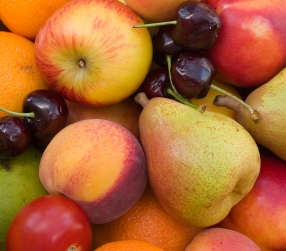Have you been hearing stories that fats are better than carbs for fuel for endurance athletes? Maybe you have wondered if scientific research supports those stories?
To find out about the latest science, I recently attended the annual meeting of the American College of Sports Medicine (ACSM), an organization comprised of more than 26,000 exercise physiologists, sports nutrition researchers, and sports medicine professionals all eager to share both their research and extensive knowledge.
At this year's meeting in San Diego in May 2015, I was able to confirm that carbohydrates are still the preferred fuel for all athletes. Here's what I learned:
- Louise Burke PhD RD, Head of Sports Nutrition at the Australian Institute of Sport, verified that carbs are indeed an essential fuel for athletes who train hard and at high intensity. That is, if you want to perform faster, harder, and longer, you'll do better to periodise your eating around hard training sessions with carb-based meals (pasta, rice) rather than with a high protein and fat meal such as meat and salad doused in dressing. Carbohydrates (grains, vegetables, fruits, sugars, starches) get stored as glycogen in muscles and are essential fuel for high-intensity exercise. Athletes with depleted muscle glycogen experience needless fatigue, sluggishness, poor workouts, and reduced athletic performance. (These complaints are common among my clients who mistakenly limit carbs, believing they are fattening. Not the case. Excess calories of any type are fattening!)
- A study with Cross-Fit athletes (think Paleo Diet) who reduced their carb intake simultaneously reduced their ability to perform as well during their high-intensity workouts. Those who ate less than 40% of their calories from carbs (≤3 g carbs/pound body weight/day or <6 g carb/kg) were out-performed by the higher carb group. The lesson: eat more sweet potatoes and bananas!
- Some avid carb-avoiders endure a very low (<20-50 g/day) carb ketogenic diet. They "fat-adapt", burn more fat, and hope to perform better. Yet, most studies of athletes in ketosis do not show performance benefits. Plus, the question remains: is the diet sustainable? Who really wants to live in ketosis? No pasta, no potato, no birthday cake, no fun...
British exercise physiologist Ron Maughan PhD asked, "Why would you even want to burn more fat than carbs during exercise?" He explained that fat, as compared to carbohydrate, requires more oxygen to produce energy. Burning more fat means that you have to work at a higher fraction of your maximum oxygen uptake. "Isn't that the opposite of what you want to happen?"
Some athletes claim a key benefit of being fat-adapted is to reduce the need to consume food during endurance exercise - and thereby reduce the threat of intestinal distress. Hence, fat-adapting seems like a logical plan for numerous endurance athletes who fear sour stomachs and "fecal urgency." The problem is, if they want to make a surge, sprint to the finish, or dig deeper to go harder or longer, they will lack the glycogen required for that higher intensity burst. Hence, a better bet would be for them to train their bodies to accept food during exercise. By experimenting during training and seeking help from a sports dietitian, an athlete can figure out which fluids and foods will settle well. Perhaps a different brand of sports drink or gel, or a swig of maple syrup, could offer the needed fuel without creating distress.
- Concerns about carbs causing inflammation have prompted some athletes to avoid wheat and other grains. Yes, if you have celiac disease (an inflammatory condition with tell-tale signs such as constipation, diarrhea, bloating, stomach discomfort, and/or persistent anemia), you certainly should avoid gluten. But only 1% of the population has celiac disease and only 10% may have other wheat-related issues. Research by Canadian sports nutritionist Dana Lis RD suggests that gluten does NOT cause inflammation in athletes who do not have celiac disease or a medical reason to avoid gluten. Those who claim to feel better when eating a Paleo-type or gluten-free diet may have become more nutrition-conscious. They feel better because they are eating better on their whole-foods diet (as opposed to their previous "junk food" diet).

- Carbohydrates from colorful vegetables and fruits are particularly important for athletes. They help keep your body healthy. Montmorency cherries are a case in point. The deep red color of these tart cherries comes from a plant compound (anthocyanin) that reduces inflammation and muscle soreness. Athletes who consume concentrated, tart cherry juice "shots" (or drink 8 ounces of tart cherry juice twice a day) recover better after hard exercise than their peers who don't drink tart cherry juice. For master's athletes, tart cherry juice can help calm the inflammation/pain associated with osteoarthritis.
The bottom line:
- Enjoy a foundation of quality carbs at each meal to fuel muscles.
- Include a portion of protein-rich foods in each meal to build and repair muscles (for example, scrambled eggs + bagel; turkey in a sandwich; grilled chicken with brown rice and veggies).
- See if you perform better.
Sports nutritionist Nancy Clark MS RD CSSD is a longtime MomsTEAM expert and contributor with a private practice in Newton, Massachusetts (just outside Boston), where she helps both fitness exercisers and competitive athletes create winning food plans. Her best-selling Sports Nutrition Guidebook, and food guides for marathoners, cyclists and soccer players, as well as teaching materials, are available at nancyclarkrd.com. For online and live workshops, visit NutritionSportsExerciseCEUs.com. You can follow Nancy on Twitter @nclarkrd.








